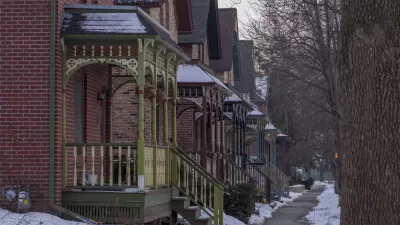Minneapolis combines prosperity with plentiful affordable housing, an increasing rarity. Geographical factors play a role, but longstanding "fiscal equalization" policies may make the difference.

Minneapolis offers mobility and career opportunities that belie its affordable housing prices. Derek Thompson puts forward "fiscal equalization," a set of laws dating from the 1970s and unique in the U.S., as prime cause of that success. The policies require "all of the region’s local governments—in Minneapolis and St. Paul and throughout their ring of suburbs—to contribute almost half of the growth in their commercial tax revenues to a regional pool, from which the money would be distributed to tax-poor areas."
On top of this public-minded redistribution, the Twin Cities benefits from its status as a regional hub, drawing talent into the metro area without suffering an outflow of workers to larger cities. Minneapolis also has no shortage of land potential for expansion. A strong, affordable economy is the result.
But that might not be the full story. Another of Minneapolis' developmental "benefits" is its demographic homogeneity. Like social success stories in northern Europe (and unlike New York, Los Angeles, Chicago) the Twin Cities has never tackled significant racial challenges. As minorities migrate into the historically white region, whether a Minneapolis miracle can prevail is up for debate.
FULL STORY: The Miracle of Minneapolis

Study: Maui’s Plan to Convert Vacation Rentals to Long-Term Housing Could Cause Nearly $1 Billion Economic Loss
The plan would reduce visitor accommodation by 25,% resulting in 1,900 jobs lost.

Alabama: Trump Terminates Settlements for Black Communities Harmed By Raw Sewage
Trump deemed the landmark civil rights agreement “illegal DEI and environmental justice policy.”

Why Should We Subsidize Public Transportation?
Many public transit agencies face financial stress due to rising costs, declining fare revenue, and declining subsidies. Transit advocates must provide a strong business case for increasing public transit funding.

Paris Bike Boom Leads to Steep Drop in Air Pollution
The French city’s air quality has improved dramatically in the past 20 years, coinciding with a growth in cycling.

Why Housing Costs More to Build in California Than in Texas
Hard costs like labor and materials combined with ‘soft’ costs such as permitting make building in the San Francisco Bay Area almost three times as costly as in Texas cities.

San Diego County Sees a Rise in Urban Coyotes
San Diego County experiences a rise in urban coyotes, as sightings become prevalent throughout its urban neighbourhoods and surrounding areas.
Urban Design for Planners 1: Software Tools
This six-course series explores essential urban design concepts using open source software and equips planners with the tools they need to participate fully in the urban design process.
Planning for Universal Design
Learn the tools for implementing Universal Design in planning regulations.
Smith Gee Studio
Alamo Area Metropolitan Planning Organization
City of Santa Clarita
Institute for Housing and Urban Development Studies (IHS)
City of Grandview
Harvard GSD Executive Education
Toledo-Lucas County Plan Commissions
Salt Lake City
NYU Wagner Graduate School of Public Service





























